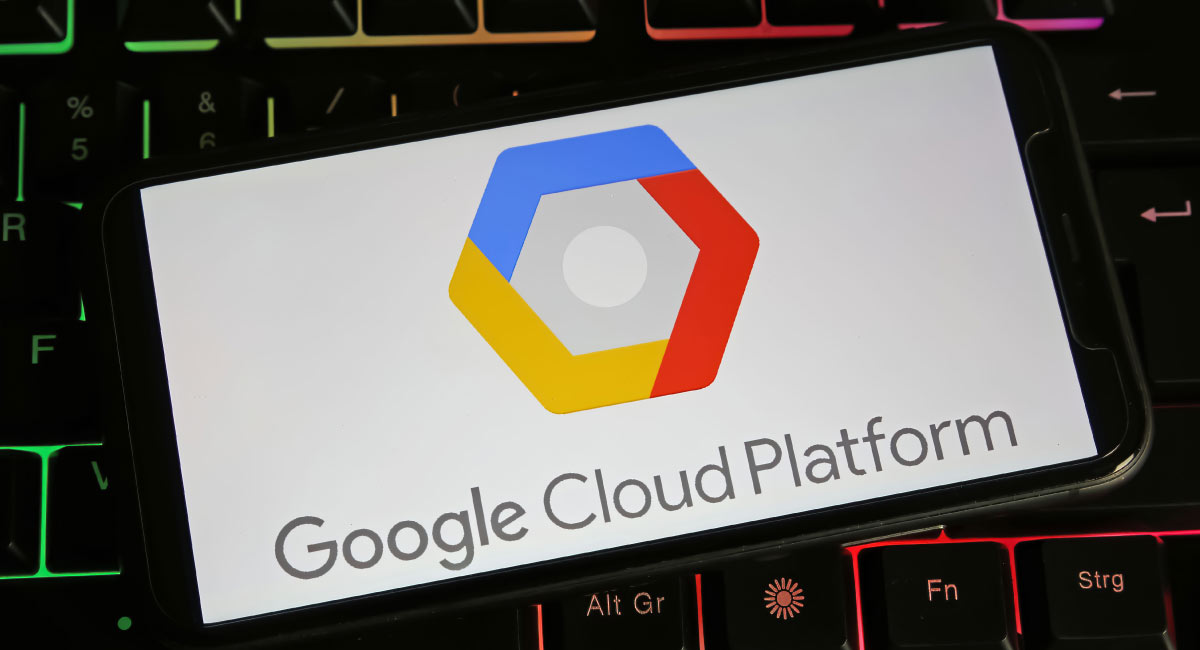Cloud computing is everywhere. As a result, consumers and businesses alike have many choices when deciding on a cloud platform. This article highlights the Google Cloud Platform and why it’s a good choice.
We will begin by describing Google Cloud Platform (GCP for short), comparing it with the competition and Google Cloud, outlining the offered services, discussing security, and showing you how to get started. We also share a comprehensive cloud computing bootcamp that trains aspiring cloud professionals.
So, what is Google Cloud Platform?
What is Google Cloud Platform? Google Cloud Platform (GCP for short) is an assortment of cloud computing resources and services Google provides. GCP boasts a useful, eclectic range of services, including databases, computing power, networking, storage, machine learning, and more, all delivered via the Internet. GCP lets businesses quickly and efficiently build, deploy, and scale applications and services without the need to manage or invest in physical infrastructure.
Also Read: Virtualization in Cloud Computing: Everything You Need to Know
Google Cloud vs. Google Cloud Platform
Yes, there’s a difference. Google Cloud features a combination of services available via the Internet that helps organizations go digital, while Google Cloud Platform is a part of Google Cloud. Other services in Google Cloud include:
- Application programming interfaces (or APIs) for machine learning and enterprise mapping services, supplying software-to-software communication
- Google Workspace, previously called G Suite and Google Apps, provides Gmail, organization identity management, and collaboration tools.
- Enterprise versions of Android and Chrome OS. These systems connect users to web-based applications
What is Google Cloud Platform, and What are its Components?
GCP is broken down into many components, organized here according to function.
Cloud Computing
- Compute Engine. Provisions virtual machine machines to deploy the application.
- Google Kubernetes Engine (GKE). This service deploys applications while the Google Cloud handles autoscaling and load balancing.
- App Engine. This is a scalable runtime environment mostly used to run Web applications. Since it provides a secure execution environment and numerous services, App Engine simplifies the creation of scalable and high-performance web apps.
Data Analytics
- BigQuery. BigQuery makes large-scale data analysis accessible to everyone.
- Dataflow. Dataflow is data flow analysis in control flow graphs, making optimization easier.
- Pub/Sub. This asynchronous and scalable messaging service allows services to communicate asynchronously.
Machine Learning
- Vertex AI Platform. This fully managed, unified AI development platform is designed for constructing and using generative AI.
- AI Platform Training. Users can train AI models with the help of this component.
- AI Platform Prediction. The prediction task lets users create and send a batch prediction job to Cloud AI Platform Prediction services.
Networking
- Virtual Private Cloud. VPC lets you deploy your application in a private network accessible through Google Cloud.
- Cloud Load Balancing. This vital service distributes the cloud across multiple copies of your applications.
- Cloud CDN. This service caches the content and delivers it to end users through edge locations.
Productivity and Collaboration
- Google Workspace. Google Workspace products (G Suite) include Calendar, Drive, Gmail, etc.
- Cloud Identity and Access Management (IAM). Identity and Access Management (or IAM) allows administrators to authorize who can perform actions on specific resources. This gives administrators complete control and visibility to manage Google Cloud resources centrally.
Storage
- Cloud Storage. There is plentiful storage, and it is easily accessible.
- Persistent Disk. This storage disk can be attached to virtual machines.
- Cloud SQL. This is a fully managed service by GCP, offering MySQL, PostgreSQL and SQL Server.
Also Read: Understanding Cloud Access Security Brokers: Safeguarding the Cloud Frontier
Getting Started with Google Cloud Platform
So, you’ve decided to sign up for GCP. Congratulations! Here’s how you get started.
- Step 1. Select the plan based on your business. If you’re unsure but want to learn more about the service without a significant financial obligation, GCP will provide you a $300 free credit to get you started.
- Step 2. Your free account will be valid for 90 days after you create it. You can now start creating your project, which means you can track all resource usage under this project.
- Step 3. Billing begins when you start using the service, using a pay-as-you-go billing model; thus, you’ll be charged only for the resources you use.
- Step 4. Carefully choose the services you want to use, depending on the needs of your application.
- Step 5. Deploy your application to the cloud after you choose your services.
- Step 6. Once you deploy the application, you can monitor your resource usage using GCPs’ services.
GCP‘s Competition
GCP isn’t the only player in town—and it’s not even the biggest cloud provider. Google Cloud Platform’s three biggest competitors are listed below.
- Amazon Web Services (AWS): AWS is the most prominent global cloud computing provider, offering many services, including compute, databases, machine learning, storage, and more. It currently dominates the cloud computing market and is often considered Google Cloud’s primary competitor.
- IBM Cloud: IBM Cloud offers a solid selection of cloud computing resources, which includes infrastructure as a service (IaaS), platform as a service (PaaS), and software as a service (SaaS). It is well known for emphasizing hybrid cloud solutions and enterprise-grade services.
- Microsoft Azure: Azure is another heavy hitter in the cloud computing world, offering customers a comprehensive suite of services similar to AWS and Google Cloud. Azure benefits from Microsoft’s strong presence in the IT world and integration with many other popular Microsoft products and services.
Also Read: What is Cloud Migration? Definition, Types, Process, and More
Google Cloud Platform Security
Cloud security and integrity are significant concerns in the cloud computing community. As a result, Google Cloud Platform offers the following security options.
- Access control. Depending on individual use cases, administrators can control individual user access, such as which services they can and cannot access.
- Encryption. Google Cloud Platform offers security measures such as encryption during data transmission and storage.
- Identity-aware Proxy (IAP). With IAP, users can manage application access according to context and identity, preventing unwanted or unauthorized access.
- Network security. Administrators can create a VPC to secure the applications by deploying them in a private network and configuring the firewalls and security groups.
The Pros and Cons of the Google Cloud Platform
Here are the advantages of the Google Cloud Platform:
- Unmatched scalability and flexibility. GCP’s on-demand resources can adjust to the customer’s changing business demands, whether dealing with high-volume traffic at peak seasons or reducing capacity during slower times. This flexibility means cost savings and reducing the headaches of managing a physical infrastructure.
- It offers industry-leading compliance and security. GCP offers industry-leading encryption, intrusion detection, and security tools to prevent threats. Close compliance with regulations like HIPAA, PCI DSS, and GDPR guarantees that personal information is secure, creating trust and transparency with their clients.
- It has great AI and Machine Learning potential. GCP has pre-trained models and tools, such as AI Platform and Cloud TPU, that seamlessly integrate into the processes.
- It offers global reach and performance. Google’s vast worldwide data center network offers low latency and high reliability. GCP’s geographically dispersed infrastructure ensures that users’ applications are available even when unexpected interruptions occur.
- It is open-source friendly and developer-centric. GCP effortlessly integrates the most popular open-source technologies and languages. It offers extensive APIs, command-line tools, and SDKs.
- It’s cost-effective and transparent. Customers pay only for the resources they use, and comprehensive bill reports provide a detailed understanding of resource costs and consumption.
However, there are a few disadvantages associated with the Google Cloud Platform:
- It has a complex pricing structure. GCP pricing is complex, involving a range of pricing models, discounts for sustained use, and service-specific tiers. Navigating this pricing maze could be difficult, especially for companies with tight budgets.
- Limited regional reach. GCP has a smaller worldwide footprint and fewer data centers than giants such as AWS in certain regions. This arrangement could affect latency and performance in some areas.
- There’s limited customizability. GCP serves many kinds of users, which could translate into less granular control over specific services compared to other highly customizable platforms.
- There are vendor lock-in concerns. Due to its distinct APIs and services, it can be challenging to drop GCP. Although it’s not an ironclad lock-in, users should be aware of data portability and possible exit fees.
- Potential security concerns exist. Although GCP follows strict security standards, every cloud platform has an inherent security risk.
Also Read: What is Cloud-Native? Exploring Applications, Architecture, and Benefits
The Future of Google Cloud Platform
The Google Cloud Platform constantly evolves by expanding its resources, regions, and availability zones worldwide, making it more available for users and reducing latency. GCP conducts upgrades according to market trends and is expected to play a major role in helping businesses succeed in this increasingly digitized world.
Learn More About Cloud Computing
Cloud computing is everywhere, which means there are plenty of career opportunities in the field. If you’d like to learn more about cloud computing, look at this online post graduate program in cloud computing. This 32-week course lets you explore the latest developments in cloud computing and DevOps tools, frameworks, and best practices for a complete learning experience.
According to Glassdoor.com, cloud computing professionals today can earn a yearly average salary of $97,608. So, check out this course and see how it can enrich your cloud computing skills.
You might also like to read:
What is Serverless Computing? Definition, Pros and Cons, How It Works, and More
What is Edge Computing, and Why Should You Care?
A Guide to Multicloud Strategy






